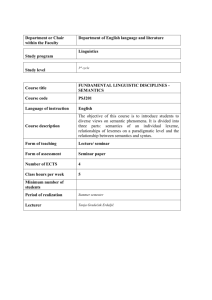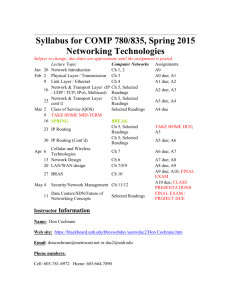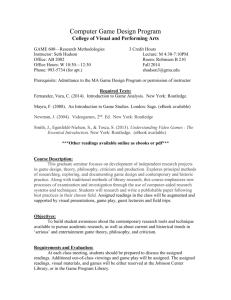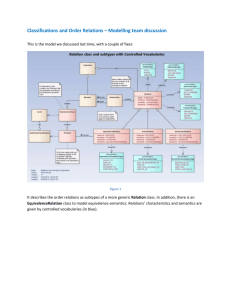Syllabus - Florian Schwarz
advertisement
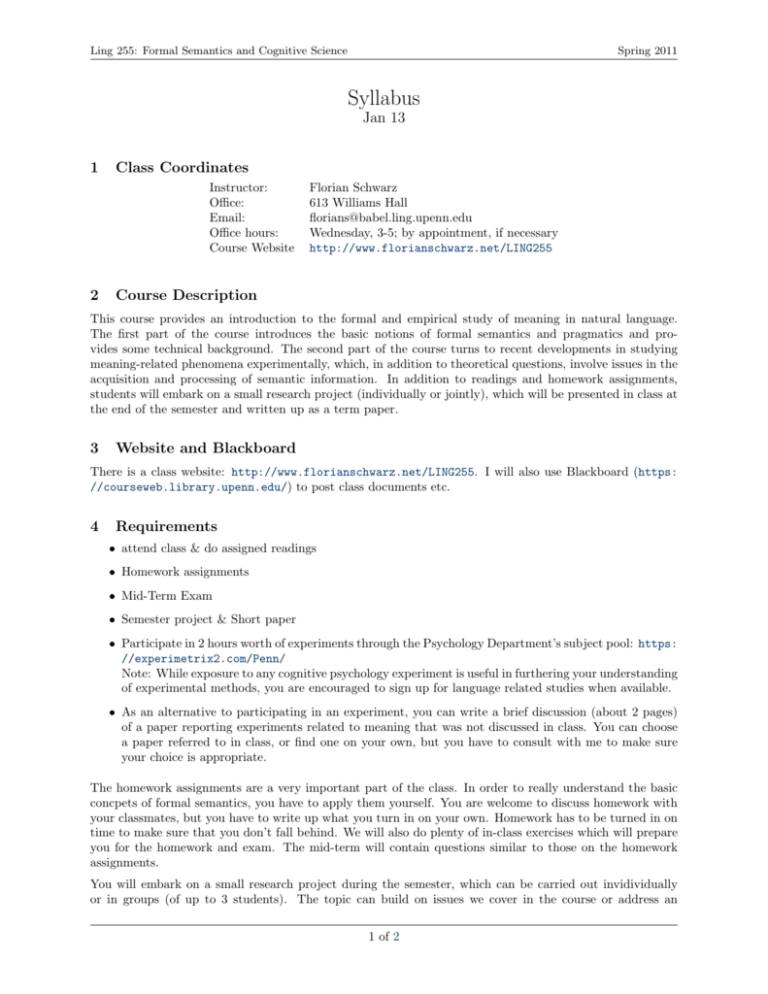
Ling 255: Formal Semantics and Cognitive Science Spring 2011 Syllabus Jan 13 1 Class Coordinates Instructor: Office: Email: Office hours: Course Website 2 Florian Schwarz 613 Williams Hall florians@babel.ling.upenn.edu Wednesday, 3-5; by appointment, if necessary http://www.florianschwarz.net/LING255 Course Description This course provides an introduction to the formal and empirical study of meaning in natural language. The first part of the course introduces the basic notions of formal semantics and pragmatics and provides some technical background. The second part of the course turns to recent developments in studying meaning-related phenomena experimentally, which, in addition to theoretical questions, involve issues in the acquisition and processing of semantic information. In addition to readings and homework assignments, students will embark on a small research project (individually or jointly), which will be presented in class at the end of the semester and written up as a term paper. 3 Website and Blackboard There is a class website: http://www.florianschwarz.net/LING255. I will also use Blackboard (https: //courseweb.library.upenn.edu/) to post class documents etc. 4 Requirements • attend class & do assigned readings • Homework assignments • Mid-Term Exam • Semester project & Short paper • Participate in 2 hours worth of experiments through the Psychology Department’s subject pool: https: //experimetrix2.com/Penn/ Note: While exposure to any cognitive psychology experiment is useful in furthering your understanding of experimental methods, you are encouraged to sign up for language related studies when available. • As an alternative to participating in an experiment, you can write a brief discussion (about 2 pages) of a paper reporting experiments related to meaning that was not discussed in class. You can choose a paper referred to in class, or find one on your own, but you have to consult with me to make sure your choice is appropriate. The homework assignments are a very important part of the class. In order to really understand the basic concpets of formal semantics, you have to apply them yourself. You are welcome to discuss homework with your classmates, but you have to write up what you turn in on your own. Homework has to be turned in on time to make sure that you don’t fall behind. We will also do plenty of in-class exercises which will prepare you for the homework and exam. The mid-term will contain questions similar to those on the homework assignments. You will embark on a small research project during the semester, which can be carried out invidividually or in groups (of up to 3 students). The topic can build on issues we cover in the course or address an 1 of 2 LING 255 Spring 2011 Syllabus independent issue. Projects will typically involve designing an experiment that addresses a question about meaning in natural language and collecting some pilot data (if possible). Exceptions for more theoretical projects may be made for students with the relevant background. Resources and references for project topics will be made available on the class website. Investigations of phenomena in languages other than English are especially welcome, in particular if you are a native speaker of another language or have easy and reliable access to one. A first proposal for the topic of your project is due after spring break. The projects will be presented in class at the end of the semester and written up as a term paper. Your grade for the class will be based on your homework (40%), your mid-term (15%), your project and paper (30%), class participation (10%), and your experiment participation / paper discussion (5%). 5 Textbook Portner, P. 2005. What is Meaning? Blackwell. [excerpts will be made availabe on Blackboard] Other useful resources: The website contains links to further resources. I will use Zotero (www.zotero.org) to share references and readings, so you will have to create an account. Some further helpful resources: • Bach, E. 1989. Informal Lectures on Formal Semantics. State University of New York Press. • Chierchia, G., and McConnell-Ginet, S. 1990. Meaning and Grammar: An Introduction to Semantics. MIT Press. • Kearns, K. 2000. Semantics. St. Martin’s Press. • Stanford Encyclopedia of Philosophy: http://plato.stanford.edu/ • MIT Encyclopedia of the Cognitive Sciences: http://cognet.mit.edu/library/erefs/mitecs/ • http://www.euro-xprag.org/ Lecture notes and further readings will be made available online. 6 Tentative Schedule This is a preliminary schedule for the semester, subject to change. More details and links to readings will be posted as we go along. • Course Overview & Introduction • Introduction to Experimental Methods • Meaning Composition • Quantifiers: Logic and Language • Predicates as Functions • Implicatures: Acquisition & Processing • Modifiers • Referring Expressions • Presuppositions and Common Ground: Processing in Context • Experimental Work on Reference • Project Presentations 2 of 2



